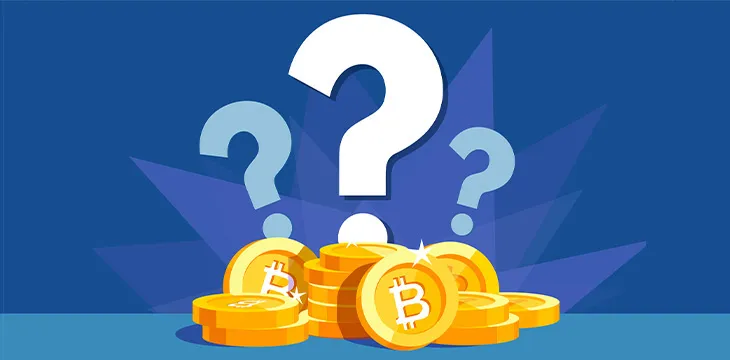|
Getting your Trinity Audio player ready...
|
As the digital currency industry, in general, suffers a 70% decline in value, the narrative in the greater digital currency economy seems to be making a momentous shift. As some “crypto” enthusiasts are quick to point out that this recent decline is “just another temporary lull” in the market while encouraging investors to “hold tight” yet again, others are starting to notice that there are signals present that this time isn’t going to be like the others.
For one, this crash is happening within a global backdrop of uncertainty, war, and inflation, the exact environment in which bitcoin “store of value” proponents have been saying is the exact situation that would cause a global exit from fiat currencies and a massive “flight to quality1” to Bitcoin.
Moreover, this massive deleveraging of the market is happening in the middle of, or as some may say, started by, a massive implosion of the recent darling “innovative” area in digital currency, the DeFi movement. This recent cockamamy idea saw the almost overnight rise of multimillion dollar2 yield farming and decentralized lending markets. These companies, with which you must have become familiar over the last couple of weeks, such as Celsius, Terra/Luna, BlockFi, etc., have been gathering deposits from the public, locking them up into loan pools, and paying upwards of 20% interest on them, and in turn loan out these funds to degenerate gamblers so they can trade on ever-increasing levels of leverage and margin on the bucket shop exchanges.
Stablecoins mass delusion—how can so many people be wrong?
All the “big names” in the industry all bought into it. Mike Novogratz even got a tattoo. Then, suddenly, it all ended. In less than a month, a trillion dollars was wiped out. Was that money real in the first place? Or was it just the manifestation of many people’s over-exuberance and over-confidence in their own abilities and the value of this “innovation” in technology that they were shepherding to the world?
A father in Korea drives his car with his whole family in it into a lake, opting for mass suicide/murder instead of a life of destitution and shame after having lost the family’s savings investing in the “secure” and safe digital currency lending scheme. After all, the founder was a native Korean, and he went to Stanford and worked at Apple and Google. How could he be so wrong?
The world is suffering from the disease of too much information and over-reliance on self-declared experts. In a normal societal system, successful people are generally right because their ability to be correct is the reason for their own success, but this indicator does not work in digital currency. In “crypto,” the wealthiest folks are generally the dumbest in the room.
They will say that we, the conservatives, just “don’t get crypto,” that this is the “new financial revolution,” and that traditional rules just don’t apply. But in truth, they are just deluding even themselves. In a system where getting rich is more about being lucky than it is about being smart, it’s no surprise that the community is rife with so many so-called experts. We ignore them as we ignore the crazy guy screaming at the pigeons on the street.
The trouble then is that ordinary people can’t tell the difference between the real experts and the egotistical and lucky or the charlatans. Everyone who got into digital currency early on and took a risk with some investment made a lot of gains. So the signal-to-noise ratio in the space is very low. So who can you trust?
Trust No One—but if you have to, only the conservatives
Looking around us now at the constant stream of insolvencies cropping up in the industry, it is clear to anyone that we are facing a contagion story that is almost as big as the mortgage crisis of 2008. At that time, it was also unconstrained greed and excess on the part of the lower classes and those that couldn’t afford their debts and excesses that were preyed upon. And like the mortgage brokers back then, digital currency exchanges now are more than happy to facilitate the rampant gambling habit of the nouveau rich, giving them more leverage and the ability to roll their quick gains into more risky investments.
The problem is that this plays on the basic human tendency to assume that if they made a lot of money, then they must have done something right. If reckless risk-taking worked in the past, then why shouldn’t one try to continue the streak?
You have to know when to walk away, know when to run—a wise cowboy
In typical markets, this eventually stops when no new joiners are willing to take a spin at the roulette wheel. When rationality wins over exuberance and the markets settle back down to cautious optimism from reckless sky-high extravagance.
However, the problem is this is not a normal market. This is a market that is pretty much exclusively run by unregulated casinos, all bent on feeding the public their addiction drug, without any moral regard to whether or not it is actually good for them. Too many people are in far too deep reputationally to admit that they have taken an active role in leading people astray.
“It all just happened so fast and we all started out with good intentions,” they tell themselves.
As with gold, or now “digital gold,” as some would want you to believe, the various exchanges can now operate based on monthly offsets.
“Coinbase (NASDAQ: COIN), Square (NASDAQ: SQ), and the other bucket shops that act as banks while flouting laws and removing consumer protection turn the financial system into a casino—where they act as the gatehouse to the virtual Fort Knox. They keep a record of the digital gold. But, as with Fort Knox, nobody knows what they hold. Fractional-reserve banking started with the same idea.” — Dr. Craig Wright, Banking Old Wine in New Bottles3
Can you blame them, though? They were just the ones who were smart enough to know that they could fool 80% of the people and had the pedigree to look the part. They needed poster children to champion the movement, and there were plenty to choose from.
And when it all goes down, as this industry has none of the protections put in place that the existing banking system does (how ironic), it won’t be the CEOs of the digital currency exchanges who will be on skid row. They will have retired from public life on their own tropical island.
So in a step-by-step fashion, with plenty of people warning of the inevitable, people drawn by greed walked hand in hand into the smokehouse, and we are soon to have our first batch of bacon. How can we start to change things so that we as a society don’t keep on making the same mistakes? How can we learn from this?
The first thing we must do is simply acknowledge it. There are many who will not head to even a hint notion that they fell willingly into a cult of technocracy and demagoguery. Besides, “how can [insert famous crypto-fluencer here] ever lie to me?” They seem to share all the same “little guy vs. ‘the man'” values that I hold dear. They would never betray me. They have me in mind. Right?
“Part of the problem is that conmen are being paid by conmen, shilling investments without a license or any knowledge of what they are actually selling, while trying to pitch you into buying and selling investments without explaining the risk. And then, people read the now delusive brand header and think that a contributor is really a journalist. Forbes says, “Opinions expressed by Forbes Contributors are their own.” The reason for saying so is simple: such people are bloggers without journalistic training or any responsibility.” — Dr. Craig Wright, How the world works; a discourse on fake news4.
We have an unfortunate feedback loop in play here where those who got into digital currency first —most likely because they were not busy enough at their full-time job—got rich out of sheer luck of being in the right place at the right time. Then in their hubris, they convinced themselves that this dumb luck and conviction strategy was something that is infinitely repeatable for everyone if they only could believe it enough. So they started this cult of “repeat the thing I did… take massive risk, commit your money, and just sit back and wait.”
The sad thing is that due to the exponential rise in the price of the assets, people investing today are taking magnitudes more risk than the early digital currency millionaires did. Very few of them risked more than US$20,000. They made millions. In order for you to repeat some feat now, you have to take out loans, second mortgages and invest US$200-500,000, and you will likely never see millions. This is the sad truth that the Michael Saylor’s and the Anthony Pompliano’s won’t tell you.
As we ease into this latest digital currency deleveraging, I hope everyone takes the time to step back, calm down, and evaluate what investing is really about. You should put your money into something with real long-term value, something people can use, not just hold. Something which provides for new goods and services creation and trade between parties that couldn’t transact before. Something that actually brings outside capital into the economy not as an investment, but as payment for goods and services.
Not something that the popular talking heads in the media are telling you about. They already got in early. It’s in their interest to keep their own portfolio afloat at your expense. There is no honor among thieves.
/Jerry Chan
Wall Street Technologist
***
NOTES:
[1] This phrase is quoted not because it is so-called in the industry, but because it is said sarcastically in the context of bitcoin proponents.
[2] Paper value, mind you, value also largely affected and propped up by the inflated value of the crypto markets in general
[3] https://craigwright.net/blog/alternative-coins-systems/banking-old-wine-in-new-bottles/
Watch: The BSV Global Blockchain Convention panel, The Future World with Blockchain
https://www.youtube.com/watch?v=v9hDGDoy1mM

 07-31-2025
07-31-2025 




